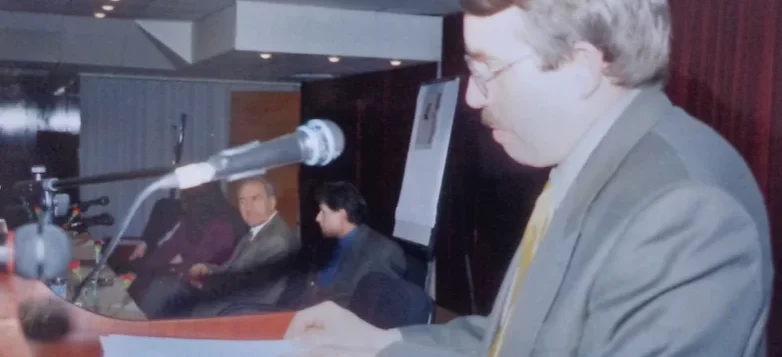…Kështu që përderisa vazhdonim punën, e dini, unë po jetoja në një shtëpi atje lart dhe ishte, ishte interesante për mua sepse kur shikoja nga dritarja e pasme, nga dhoma ime e gjumit, shikoja poshtë mbi atë që më vonë zbulova se ishte Fakulteti i Arkitekturës i Universitetit të Prishtinës. E dini, universiteti paralel, dhe unë mund të shikoja poshtë në këtë ndërtesë të papërfunduar, nuk kishte dritare, e dini, ishte vetëm betoni dhe tullat e kuqe. E dini, kjo ishte gjithçka, por nuk kishte xham dhe studentët ishin ulur në stola brenda kësaj ndërtese të papërfunduar, të mbështjellë me pallto, kapele dhe doreza gjatë dimrit, dhe kishin tabelat e tyre të vizatimit dhe vizoret e tyre dhe gjithçka. Dhe unë thjesht qëndroja atje lart dhe e shikoja këtë dhe mendoja, ‘e dini, o Zot, si mund të duan të studiojnë kaq shumë?’
Michael McClellan u lind në vitin 1956, në Kentaki, SHBA. Ai studioi shkencat politike në Universitetin Luisvill. Gjithashtu studioi për fotoreporter dhe marrëdhëniet ndërkombëtare në Universitetin Sirakuzë. Në vitin 1984 u bë pjesë e shërbimit të jashtëm të SHBA-ve dhe punoi në shumë vende. Në vitin 1996 erdhi në Kosovë për të punuar si diplomat në qendrën e informimit, zyren e parë amerikane në Kosovë. Me shërbim në Kosovë ka qenë më shumë se pesë vjet. Në vitin 2000 u rikthye në Kosovë kur filloi themelimin e Universitetit Amerikan të Kosovës.
